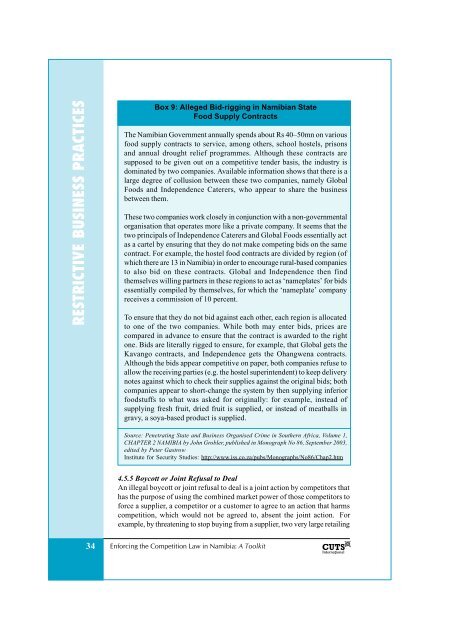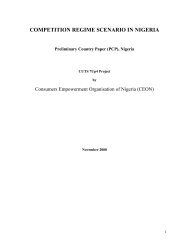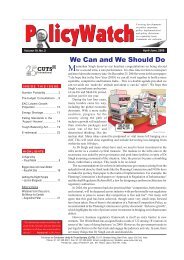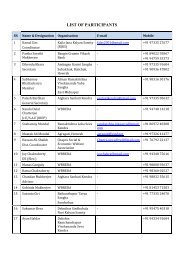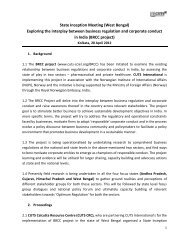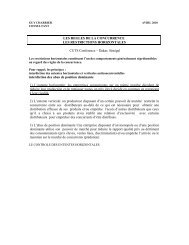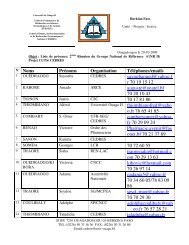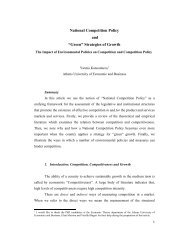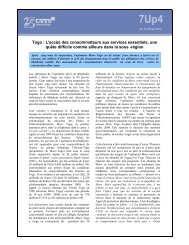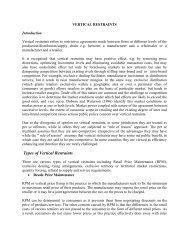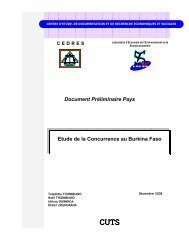Enforcing the Competition Law in Namibia A Toolkit - cuts ccier
Enforcing the Competition Law in Namibia A Toolkit - cuts ccier
Enforcing the Competition Law in Namibia A Toolkit - cuts ccier
You also want an ePaper? Increase the reach of your titles
YUMPU automatically turns print PDFs into web optimized ePapers that Google loves.
RESTRICTIVE BUSINESS PRACTICESBox 9: Alleged Bid-rigg<strong>in</strong>g <strong>in</strong> <strong>Namibia</strong>n StateFood Supply ContractsThe <strong>Namibia</strong>n Government annually spends about Rs 40–50mn on variousfood supply contracts to service, among o<strong>the</strong>rs, school hostels, prisonsand annual drought relief programmes. Although <strong>the</strong>se contracts aresupposed to be given out on a competitive tender basis, <strong>the</strong> <strong>in</strong>dustry isdom<strong>in</strong>ated by two companies. Available <strong>in</strong>formation shows that <strong>the</strong>re is alarge degree of collusion between <strong>the</strong>se two companies, namely GlobalFoods and Independence Caterers, who appear to share <strong>the</strong> bus<strong>in</strong>essbetween <strong>the</strong>m.These two companies work closely <strong>in</strong> conjunction with a non-governmentalorganisation that operates more like a private company. It seems that <strong>the</strong>two pr<strong>in</strong>cipals of Independence Caterers and Global Foods essentially actas a cartel by ensur<strong>in</strong>g that <strong>the</strong>y do not make compet<strong>in</strong>g bids on <strong>the</strong> samecontract. For example, <strong>the</strong> hostel food contracts are divided by region (ofwhich <strong>the</strong>re are 13 <strong>in</strong> <strong>Namibia</strong>) <strong>in</strong> order to encourage rural-based companiesto also bid on <strong>the</strong>se contracts. Global and Independence <strong>the</strong>n f<strong>in</strong>d<strong>the</strong>mselves will<strong>in</strong>g partners <strong>in</strong> <strong>the</strong>se regions to act as ‘nameplates’ for bidsessentially compiled by <strong>the</strong>mselves, for which <strong>the</strong> ‘nameplate’ companyreceives a commission of 10 percent.To ensure that <strong>the</strong>y do not bid aga<strong>in</strong>st each o<strong>the</strong>r, each region is allocatedto one of <strong>the</strong> two companies. While both may enter bids, prices arecompared <strong>in</strong> advance to ensure that <strong>the</strong> contract is awarded to <strong>the</strong> rightone. Bids are literally rigged to ensure, for example, that Global gets <strong>the</strong>Kavango contracts, and Independence gets <strong>the</strong> Ohangwena contracts.Although <strong>the</strong> bids appear competitive on paper, both companies refuse toallow <strong>the</strong> receiv<strong>in</strong>g parties (e.g. <strong>the</strong> hostel super<strong>in</strong>tendent) to keep deliverynotes aga<strong>in</strong>st which to check <strong>the</strong>ir supplies aga<strong>in</strong>st <strong>the</strong> orig<strong>in</strong>al bids; bothcompanies appear to short-change <strong>the</strong> system by <strong>the</strong>n supply<strong>in</strong>g <strong>in</strong>feriorfoodstuffs to what was asked for orig<strong>in</strong>ally: for example, <strong>in</strong>stead ofsupply<strong>in</strong>g fresh fruit, dried fruit is supplied, or <strong>in</strong>stead of meatballs <strong>in</strong>gravy, a soya-based product is supplied.Source: Penetrat<strong>in</strong>g State and Bus<strong>in</strong>ess Organised Crime <strong>in</strong> Sou<strong>the</strong>rn Africa, Volume 1,CHAPTER 2 NAMIBIA by John Grobler, published <strong>in</strong> Monograph No 86, September 2003,edited by Peter GastrowInstitute for Security Studies: http://www.iss.co.za/pubs/Monographs/No86/Chap2.htm4.5.5 Boycott or Jo<strong>in</strong>t Refusal to DealAn illegal boycott or jo<strong>in</strong>t refusal to deal is a jo<strong>in</strong>t action by competitors thathas <strong>the</strong> purpose of us<strong>in</strong>g <strong>the</strong> comb<strong>in</strong>ed market power of those competitors toforce a supplier, a competitor or a customer to agree to an action that harmscompetition, which would not be agreed to, absent <strong>the</strong> jo<strong>in</strong>t action. Forexample, by threaten<strong>in</strong>g to stop buy<strong>in</strong>g from a supplier, two very large retail<strong>in</strong>g34 <strong>Enforc<strong>in</strong>g</strong> <strong>the</strong> <strong>Competition</strong> <strong>Law</strong> <strong>in</strong> <strong>Namibia</strong>: A <strong>Toolkit</strong>


